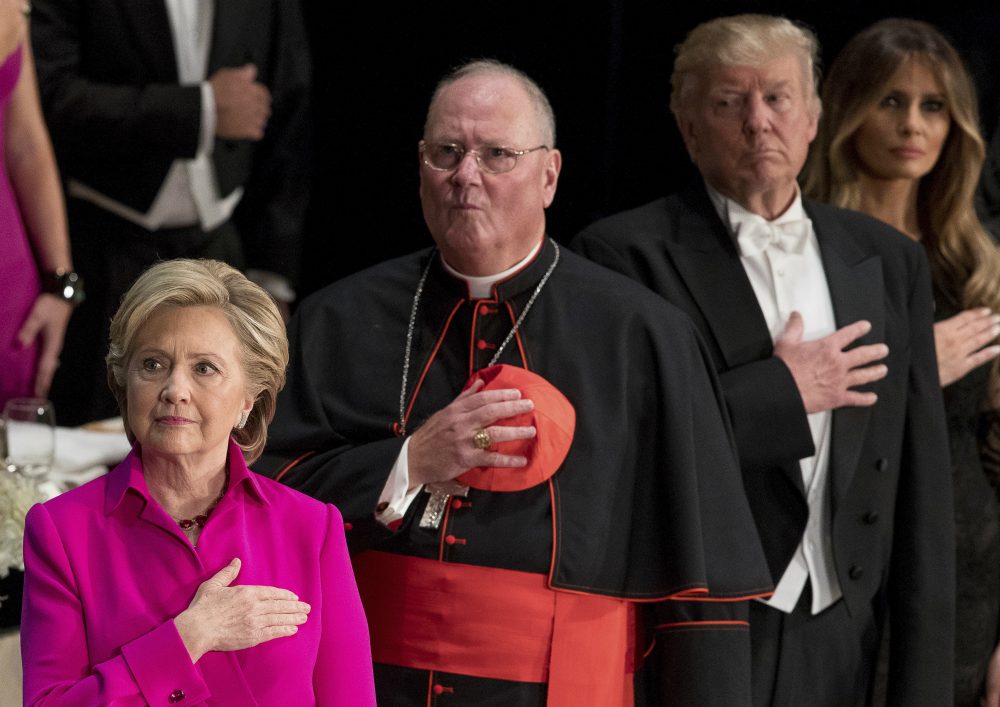Advertisement
Catholic Bishops Should Call Out Donald Trump

COMMENTARY
My late parents, Republicans both, were Richard Nixon fans. My dad had words for George McGovern, the Democrat Nixon buried in his 1972 landslide, that can’t be repeated on a family website. Yet when it became clear Nixon had covered up and lied about the Watergate scandal, they reluctantly conceded he should resign the presidency.
Their Republican son wrote off Donald Trump long ago. Political parties, as my parents’ example taught me, aren’t religions, entitled to leaps of faith. But what if one of your religious principles is affirmed by an otherwise moral slug of a candidate? America’s Catholic bishops face that conundrum, having either muted their criticism of Trump, who sides with them on abortion but stands accused of pawing almost a dozen women, or pairing it with stabs at Hillary Clinton, as if there’s a moral equivalence here.
Admittedly, religious leaders tread on a thread in public affairs. They risk their church’s tax exemption, and the ire of their politically divided congregations, if they appear too partisan. And there are people who genuinely see little moral difference between Clinton and Trump, in defiance, I’d argue, of reason. Nevertheless and with due respect, this Catholic fears the bishops are putting moral sense aside in handling the candidates.
...this Catholic fears the bishops are putting moral sense aside in handling the candidates.
A few observations lead to that conclusion:
Trump could have chosen responsible rhetoric to address his concerns about immigration in particular. Instead, he chose xenophobic language that proves him unfit to lead a diverse country. Catholic leaders meanwhile have been outspoken defenders of immigrants. For those who enter illegally, the United States Conference of Catholic Bishops supports a path to citizenship, saying that “survival” from poverty is “the primary impetus for unauthorized immigration.”
Earlier in the race, and to their credit, the bishops condemned Trump’s venom. Last year, when the Republican proposed his ban on Muslim immigration, the conference president, Archbishop Joseph E. Kurtz, said immigration laws should keep the country safe “but should never target specific classes of persons based on religion.”
Since then, however, the bishops have become bashful: As indefensible comments increasingly escaped from the minimum-security facility that is Trump’s mouth, they coupled any criticism with silly digs at Clinton.
Advertisement
Of the infamous Trump video boasts of sexual predation, Kurtz declared, “Too much of our current political discourse has demeaned women and marginalized people of faith.” Given the context, this isn’t exactly a full-throated denunciation. Apparently more irksome to Kurtz was the revelation of 4-year-old emails between Clinton’s (Catholic) campaign manager and a lefty activist, in which the latter called for a “Catholic Spring” of progressive revolt against the church’s traditionalist social teachings. The exchange, Kurtz alleged, revealed efforts to “interfere in the internal life of the church.”
The charge, and I’m being polite, is horse puke. A “Catholic Spring,” achieved by reform, is what theologically liberal Catholics discuss all the time at cocktail parties. Indeed, it’s already happened, unofficially, in this country, where most lay Catholics diverge from the hierarchy’s opposition to birth control, women’s ordination, and other matters.
In another case last month, Philadelphia’s archbishop called Trump “a belligerent demagogue with an impulse-control problem,” a statement indisputable by anyone who’s been awake for the campaign. But he also called Clinton “a criminal liar, uniquely rich in stale ideas and bad priorities.” The “uniquely rich” clause in that sentence sounds more like the partisan punditry prelates are supposed to avoid.
And “criminal liar?” Clinton occasionally has flip-flopped, and neither I nor the archbishop know whether she lied in dismissing her husband’s affairs and allegations of non-consensual assaults. But she’s been convicted of nothing criminal, even given the FBI’s renewed interest in her emails. And if mere allegations of misbehavior condemn the Democrat, then what of Trump’s alleged sex assaults, alleged fraud, and his settlement with the government over racial discrimination?
Add in his worrisome strongman personality, and he’s made the election easier for people who complain about choosing the lesser of evils. As evil goes, this is a contest between a dollar-store shoplifter and the Dalton gang.
The faux equivalence bishops make between the candidates could owe to policy disagreements with Clinton, from gay marriage to Obamacare’s contraception requirements. But the real burr in the episcopate’s saddle, according to some Catholic observers, is abortion.
But the real burr in the episcopate’s saddle, according to some Catholic observers, is abortion.
Trump says he’s against abortion rights; Clinton supports them. Were Kurtz to speak forthrightly about things such as Trump’s alleged sexual assaults, “he’d get plastered by pro-life organizations and the bishops who support those organizations,” the Rev. Thomas Reese of The National Catholic Reporter told The Boston Globe.
I mostly agree with my church’s anti-abortion stance. But it's not at all clear Trump does. His hops back and forth on the issue would awe a kangaroo. Even assuming he’s sincere now, the church’s former leader lit the moral path to opposing such a candidate. Benedict XVI, before he was pope, argued that Catholics could support a pro-choice politician if that weren’t the reason for their support, and if there were other, urgent moral considerations.
Trump provides no shortage of those. If the bishops hoped to recover some of the moral authority they lost in the pedophile scandal, pretending there isn’t a real choice Nov. 8 is hardly the strategy that Solomon would have suggested.
